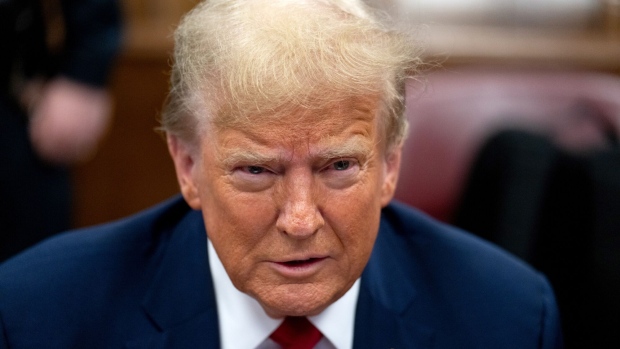Apr 26, 2024
Trump ‘Hush-Money’ Trial: Key Takeaways From Week One
, Bloomberg News

(Bloomberg) -- The opening week of Donald Trump’s historic hush money trial offered plenty of insights into how his 2016 presidential campaign teamed up with a tabloid publisher to silence embarrassing stories from women who said they’d had extramarital affairs with him.
David Pecker, the former chief executive of the firm that published the National Enquirer, spent the majority of the week on the witness stand. Prosecutors wanted to use Pecker’s testimony to showcase the former president’s involvement in paying off women. Trump is accused of falsifying business records to cover up the payment of $130,000 to silence porn star Stormy Daniels.
Prosecutors said the payment’s purpose was to influence the 2016 election. Trump’s lawyers countered that the payment had nothing to do with the election, but instead was a standard nondisclosure agreement meant to protect his reputation and brand.
Here are five takeaways from the first week:
Influencing the Election?
Pecker testified that he promised to serve as the “eyes and ears” of the Trump campaign, promised to publish positive stories about Trump and attack his rivals. Pecker said he would tell Trump’s attorney, Michael Cohen, whenever he heard about women shopping stories.
Pecker explained why his firm, American Media Inc., paid $150,000 to former Playboy Playmate Karen McDougal to keep quiet about her claims of a yearlong affair with Trump.
Pecker said he expected plenty of women to come forward with stories about Trump when he was running for president and because “Mr. Trump was well-known as the most eligible bachelor and dated the most beautiful women.”
Trump’s lawyers sought to debunk the election influence attack, suggesting that Pecker made similar deals with other celebrities without any political considerations.
Tabloid Journalism
Pecker’s testimony detailed an unsavory world of checkbook journalism at the Enquirer, which paid sources for stories, leveraged dirt on celebrities and willingly served as an extension of the Trump campaign.
Jurors heard that Trump was a favorite of Enquirer readers. Beyond paying for stories, the Enquirer would send draft articles about Trump to Cohen for his comments.
It also attacked Trump’s campaign rivals in 2016 with headlines like “Shocking Claims: Pervy Ted Cruz Caught Cheating – With 5 Secret Mistresses!” and “Senator Marco Rubio’s Cocaine Connection!”
Pecker said AMI paid $30,000 to buy a story from a former Trump Tower doorman claiming that Trump had fathered a child with a housekeeper. The Enquirer concluded the story was false, but said if it was true the tabloid could have sold more copies than one about the death of Elvis Presley in 1977.
‘Nice Girl’ Silenced
Much of Pecker’s testimony focused on the AMI deal with McDougal, who said she had an affair with Trump that spanned nearly a year after meeting him in 2006.
Pecker said he first heard about McDougal’s story in June 2016 from an Enquirer editor, and he alerted Cohen. Pecker said he believed McDougal’s account and that he talked to Trump before agreeing to pay $130,000 to buy her silence. Trump praised her as a “nice girl.” After his election, Trump invited Pecker to the White House, where he also asked about McDougal’s well being.
Beyond agreeing not to publish her account, AMI said it would run 96 columns written by a ghostwriter for her over two years, and ended up publishing 65, Pecker said. Trump’s lawyer suggested the August 2016 contract was an innocent effort to “recharge” her career.
Stormy Daniels
After AMI paid for the McDougal and doorman stories without getting reimbursed, as he was promised, Pecker had no more appetite to pay for stories involving women and Trump, he testified. So Pecker resisted pressure by Cohen to buy the Daniels story after the release of the now famous Access Hollywood tape in which Trump bragged about sexually assaulting women.
Pecker said he told Cohen he was “not going to be involved with a porn star” and “I am not a bank.”
He made clear that he was frustrated with Cohen’s promises that he would be repaid. With Pecker holding firm, Cohen himself paid to silence Daniels, and Trump later repaid him in a series of checks. It’s the records of those repayments that form the basis of the charges.
Celebrities Exposed
Jurors heard about how the Enquirer treated other celebrities suspected of sexual dalliances, like Arnold Schwarzenegger and Tiger Woods.
Pecker said AMI bought a story about Woods in 2007 but didn’t publish it. Rather, it leveraged the story to get Woods to agree to an interview and cover story in Men’s Fitness, an AMI magazine, even though he had an exclusive contract with another publisher.
After Schwarzenegger announced his run for governor in 2003, Pecker said, “30 or 40 women” came forward to AMI with stories. AMI then spent “hundreds of thousands of dollars” to buy their accounts but did not publish them, he said.
--With assistance from Patricia Hurtado and Erik Larson.
©2024 Bloomberg L.P.








